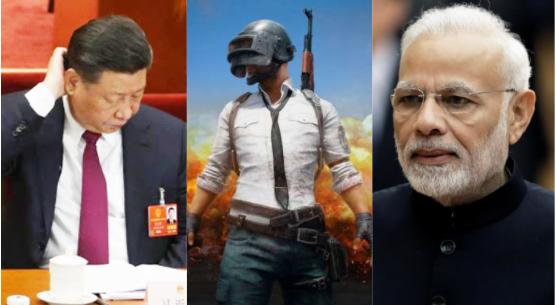India is making life increasingly difficult for China and its mobile applications sector, as the Modi government’s onslaught against the espionage tools of the Chinese Communist Party seems to be unending. Around the world, there is a growing consensus that China and its ruling red party uses mobile applications distributed across the world as tools for espionage, spying and data thefts. It was seen how the world community welcomed and took inspiration from India’s daring ban on TikTok and 59 other widely used applications in June. Now, with India banning PUBG Mobile and its variants too, among the 118 applications, the path is set for the demolition of China’s cheap app sector.
As the government of India announced yesterday an even more extensive ban against Chinese tools of espionage or ‘applications’, one name which stood out was that of PUBG Mobile. To ban a gaming app as popular as PUBG goes on to show how determined the Modi government is to teach China a lesson. The latest ban on 118 Chinese apps is all set to hurt the fortunes of Tencent Holdings Ltd, China’s leading search engine Baidu Inc, Xiaomi’s ShareSave and online payments giant Ant Group Co.’s platform Alipay. PUBG Mobile Nordic Map: Livik and PUBG Mobile Lite have also found mention in the blockade list.
The massive ban on Chinese tech services/apps by India will result in investors growing apprehensive of putting in their fortunes with Chinese companies, as in post-CoVID world order, no one knows which country might end up taking anti-China decisions. Instead, investors will be looking at putting their money in more stable economies, such as India, who face no negative sentiments globally. This will spell the death knell for the Chinese tech sector.
Interestingly though, PUBG, which is the PC version of the same game has been excused from the ban, and only the mobile version of the same has been kicked out of India’s cyberspace. This is due to the fact that while PUBG Mobile has an explicit Chinese link, its PC version does not. PUBG, which is the PC variant of the game has been both developed and published by Korean developer – PUBG Corp, which is a subsidiary of the South Korean video game company Bluehole Studio. It is now held under a unified gaming brand named Krafton Game Union.
PUBG Mobile, however, has been developed as a mobile application by Tencent Holdings, which is a Chinese Holding conglomerate. Although the game has taken its essence from PUBG Corp, the mobile version has been both developed and published by Tencent, leading to its ban in India, due to an obvious China link. Tencent Games also bought a 10 per cent stake in Bluehole, in mid-2018.
It was due to Tencent buying a 10 per cent stake in Bluehole that they were allowed to develop the game for China and in a mobile version for global distribution. The ban by India on Chinese apps will have a spillover effect for such transactions of global companies with Chinese entities too. No country and its companies would want to associate with Chinese entities, only to face irrevocable damage to their fortunes in economies like India.
Essentially, India has signalled that it will block all goods and services with a Chinese link, whether they be toys, infrastructure development projects, oil, tech services, mobile apps, telecommunication material, etc. As such, it has led the way for countries around the world, who believe in values of democracy and freedom to do the same. For Chinese apps to be banned in India, which is a country where any app’s true success can be gauged, is a huge PR and reputational disaster for them. Getting banned in India for no less than infringing upon the world’s largest democracy’s national security will have severe consequences for the Chinese tech and app industry, not to mention the monetary loss that they would be suffering due to the same.
Some might argue that the revenues from India, for certain Chinese apps like PUBG are ‘minuscule’. However, in the long run, India has dug the grave of the Chinese tech sector, which countries across the world will push China into. In the long run, also, the losses for China are going to be unprecedented. We must not forget that India is also looking at cutting its dependency on Chinese goods. For example, PM Modi is heading the mission to transform India into a global toy manufacturing hub, which will spell a disaster for the already dilapidated and overestimated Chinese economy.
Only recently, as reported by TFI, India has stopped purchasing Chinese oil. Indian State refiners have stopped buying crude oil from Chinese companies. Now, India is not only going to cause heavy losses to the Chinese oil companies but is also creating far-reaching repercussions when it comes to the equity stakes of Chinese companies in oilfields around the world.The State refiners in the country alone control India’s 3 million barrel-per-day refining capacity, and now, China stands evicted from this massive crude oil supply chain. The message is clear: anything Chinese will be banned in India without blinking an eye.
